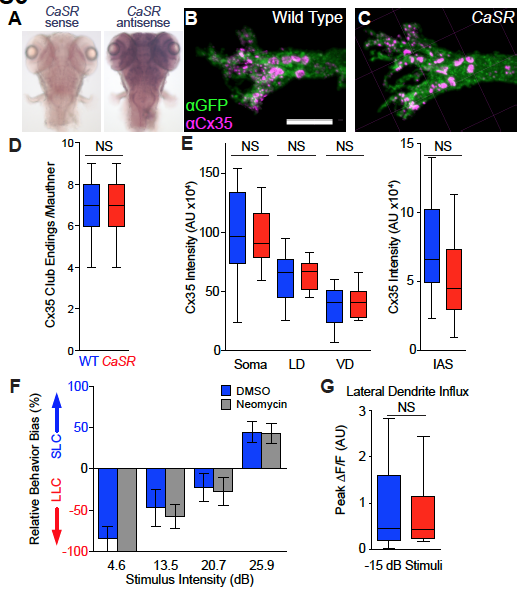Fig. S5
Impact of CaSR on Mauthner neuron synapses and synaptic influx, Related to Figure 3.
(A) CaSR antisense probe in situ hybridization shows broad expression through the brain (104 hpf).
(B-C) Confocal projection images of 144 hpf wild type sibling (A) and CaSR mutant Mauthner neuron lateral dendrites. Mauthner neurons labeled with Tg(hsp70:GAL4FFDMC)130a; Tg(UAS:gap43-citrine) transgene combination and stained with anti-GFP (?GFP, green) and anticonnexin 35 (?Cx35, magenta). Scale bar indicates 10 ?m. For clarity, labeling in both channels is shown following thresholding through Imaris software to eliminate non-Mauthner staining.
(D-E) Quantification of ?Cx35 staining of Mauthner neurons from sibling (blue) and CaSR mutant (red) larvae including counts of large Club Ending synapses (C) and total ?Cx35 intensity on segmented Mauthner neuron surfaces (D). N= 15 wild type siblings and 12 CaSRp190 homozygous mutant neurons analyzed (see also Figure 3).
(F) Relative behavioral bias of control larvae (DMSO, blue, N=23) and larvae treated with 40 ?M neomycin (grey, N=13) to ablate lateral line sensory neuromasts, 6 dpf.
(G) Peak ?F/F in the Mauthner lateral dendrite following subthreshold acoustic stimuli (-15 dB) in head-restrained sibling (blue, N=29 stimuli) and CaSRp190 mutant (red, N=24 stimuli) larvae expressing GCaMP6s. Statistical comparison by student?s t-test (NS, p=0.395).

